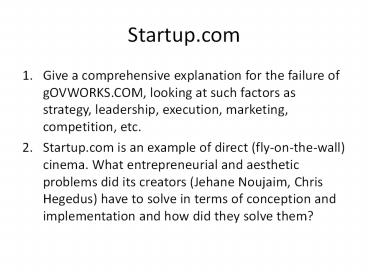Startup.com - PowerPoint PPT Presentation
Startup.com
... focuses on two industries, big tobacco and 'infotainment. ... Bergman's comment 'the press is free to anyone who owns one' ... consider other movies you are ... – PowerPoint PPT presentation
Title: Startup.com
1
Startup.com
- Give a comprehensive explanation for the failure
of gOVWORKS.COM, looking at such factors as
strategy, leadership, execution, marketing,
competition, etc. - Startup.com is an example of direct
(fly-on-the-wall) cinema. What entrepreneurial
and aesthetic problems did its creators (Jehane
Noujaim, Chris Hegedus) have to solve in terms of
conception and implementation and how did they
solve them?
2
Startup.com discussion
- After question 1
- Tom Hermans post-mortem
- Government websites
- Don Tapscotts view
- Tuzman as leader, manager
- Herman as leader, manager
3
Startup.com discussion
- After question 2
- Noujaim, Hegedus statement
- Contrast narrative approach with Enron, City Hall
- Ethical issues in funding (Gimme Shelter)
- Some differing assessments of Startup.com
- Where are they now?
4
The Insider February 18
- 1. The Insider focuses on two industries, big
tobacco and infotainment. Discuss each in terms
of corporate strategy to maximize the value of
shareholder equity, competitive threats, how
ambitious employees succeed, and the regulatory
environment. Do you think Bergmans comment the
press is free to anyone who owns one is as true
now as it was in 1999?
5
The Insider
- 2. We have now discussed the following movies and
industries Enron (energy), Startup.com (IT
startup), The Insider (tobacco, broadcast media).
What appears to be the dominant fable about the
private sector in terms of i) corporate
objectives and what they exclude, ii) strategy,
iii) organizational culture? You can consider
other movies you are aware of. What reasons would
you give for the emergence of this dominant
fable? What would a counter-fable look like?
PowerShow.com is a leading presentation sharing website. It has millions of presentations already uploaded and available with 1,000s more being uploaded by its users every day. Whatever your area of interest, here you’ll be able to find and view presentations you’ll love and possibly download. And, best of all, it is completely free and easy to use.
You might even have a presentation you’d like to share with others. If so, just upload it to PowerShow.com. We’ll convert it to an HTML5 slideshow that includes all the media types you’ve already added: audio, video, music, pictures, animations and transition effects. Then you can share it with your target audience as well as PowerShow.com’s millions of monthly visitors. And, again, it’s all free.
About the Developers
PowerShow.com is brought to you by CrystalGraphics, the award-winning developer and market-leading publisher of rich-media enhancement products for presentations. Our product offerings include millions of PowerPoint templates, diagrams, animated 3D characters and more.































